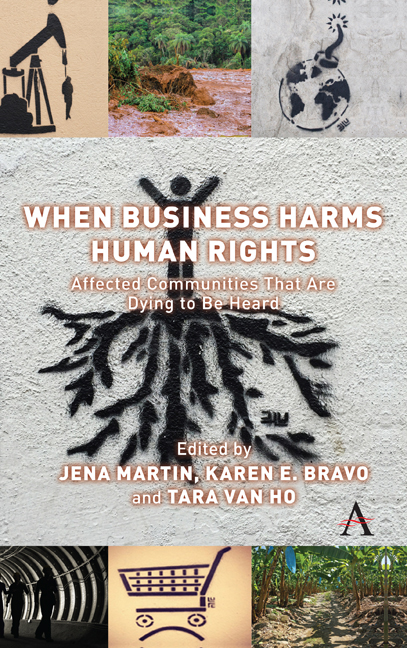Book contents
- Frontmatter
- Contents
- Preface
- Acknowledgements
- Introduction
- Chapter 1 Complicity in False Arrest, Imprisonment and Theft by a Fairtrade-Certified Company
- Chapter 2 Hindrances to Access to a Remedy in Business-Related Cases in Colombia: The Case of Gilberto Torres
- Chapter 3 The Global Pursuit for Justice for DBCP-Exposed Banana Farmers
- Chapter 4 The Rupturing of the Dam and the Community’s Social Fabric: A Testimony from an ‘Atingido’ from Bento Rodrigues, Brazil
- Chapter 5 Taming the Dragon, Unpacking Options for Access to Remedy for Violations by Chinese Multinational Corporations Operating in Chiadzwa, Zimbabwe
- Chapter 6 Máxima Acuña: The Story of How a Business Impacted Human Rights Defenders
- Chapter 7 Community Interrupted, ‘Life Projects’ Disrupted: Cajamarca, Ibagué, and the La Colosa Mine in Colombia
- Chapter 8 Occupational Health as a Human Right: A Case Study in a Turkish Free Trade Zone
- Chapter 9 The Price of the ‘Black Dollar’: Veteran Coal Miners and the Right to Health
- Chapter 10 Abandoned: A Tale of Two Mine Closures in South Africa
- Conclusion
- Appendices
- List of Contributors
- Index
Chapter 8 - Occupational Health as a Human Right: A Case Study in a Turkish Free Trade Zone
Published online by Cambridge University Press: 20 January 2022
- Frontmatter
- Contents
- Preface
- Acknowledgements
- Introduction
- Chapter 1 Complicity in False Arrest, Imprisonment and Theft by a Fairtrade-Certified Company
- Chapter 2 Hindrances to Access to a Remedy in Business-Related Cases in Colombia: The Case of Gilberto Torres
- Chapter 3 The Global Pursuit for Justice for DBCP-Exposed Banana Farmers
- Chapter 4 The Rupturing of the Dam and the Community’s Social Fabric: A Testimony from an ‘Atingido’ from Bento Rodrigues, Brazil
- Chapter 5 Taming the Dragon, Unpacking Options for Access to Remedy for Violations by Chinese Multinational Corporations Operating in Chiadzwa, Zimbabwe
- Chapter 6 Máxima Acuña: The Story of How a Business Impacted Human Rights Defenders
- Chapter 7 Community Interrupted, ‘Life Projects’ Disrupted: Cajamarca, Ibagué, and the La Colosa Mine in Colombia
- Chapter 8 Occupational Health as a Human Right: A Case Study in a Turkish Free Trade Zone
- Chapter 9 The Price of the ‘Black Dollar’: Veteran Coal Miners and the Right to Health
- Chapter 10 Abandoned: A Tale of Two Mine Closures in South Africa
- Conclusion
- Appendices
- List of Contributors
- Index
Summary
Introduction
The globalization of the world towards a single market over the last few decades generated an understanding among developed and developing countries that the more private capital flows between countries in the form of foreign direct investment (FDI), the more competing power that the countries can hold in the globalized market's raising competition. Accordingly, to attract more FDI, the world economy has witnessed an unparalleled opening and modernization of the economies of all regions, encompassing deregularization, outsourcing, privatization and private participation in the provision of infrastructures, and the reduction and simplification of tariffs. Thus, the role of FDI in generating technology transfers and beneficial spillovers to local markets has motivated policymakers to adopt policies for attracting more FDI.
Turkey, a country sitting at the crossroads of three continents, has been a salient example of a developing country which directly relies on FDIs brought by transnational corporations (TNCs) in stimulating its economy since it opened its market in the early 1980s. Indeed, in less than 30 years, Turkey has become one of the largest FDI recipient countries with a flow of foreign capital reaching to US$18 billion in 2015 according to the World Investment Report of UNCTAD.
As noted above, for a country to benefit from FDI, regulations (or, as appropriate, deregulation) creating favourable commercial, legal and social conditions that attract FDI should be put in place. This regulatory exercise is usually performed by considering the fact that FDI ‘is driven by the138 availability of cheap labour and the prevalence of weak environmental and labour regulations’.
FDI's economic stimulus for countries is accompanied by huge costs, which one cannot underestimate and must not overlook. Indeed, FDI is ‘accompanied by transfer of obsolete and hazardous technologies, chemicals, processes and waste [and] associated with an increase in assembly line, workers’ shift, low-quality jobs, with minimal options for advancement and a growth of insecure, precarious employment [particularly] for the less-industrialized countries [like Turkey]’.
Workers in free trade zones (FTZs) have been particularly affected by these subdued employment standards. For instance, FTZs have been associated with high levels of machine-related accidents, dust, noise, poor ventilation and exposure to toxic chemicals. It has been reported that accidents, stress and intense exposure to common hazards arise from unrealistic production quotas, productivity incentives and inadequate controls on overtime.
- Type
- Chapter
- Information
- When Business Harms Human RightsAffected Communities that Are Dying to Be Heard, pp. 137 - 154Publisher: Anthem PressPrint publication year: 2020



